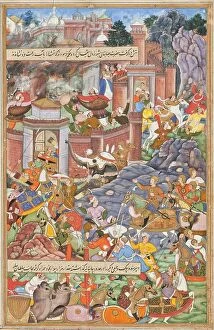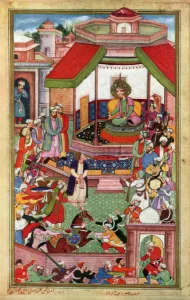Akbarnama Collection
The Akbarnama, also known as the "Book of Akbar, " is a historical account of the reign of Mughal Emperor Akbar
All Professionally Made to Order for Quick Shipping
The Akbarnama, also known as the "Book of Akbar, " is a historical account of the reign of Mughal Emperor Akbar. This magnificent work was commissioned by Akbar himself and written by his court historian Abu'l-Fazl ibn Mubarak. The book consists of detailed descriptions and vivid illustrations that capture significant events during Akbar's rule. One such illustration depicts Abul Fazl presenting the completed manuscript of the Akbarnama to Emperor Akbar. It showcases the importance placed on documenting history and preserving it for future generations. Another captivating painting portrays Hamid Bhakari being punished by Emperor Akbar, highlighting his commitment to justice and maintaining law and order in his empire. In another folio from the book, we witness a young Emperor Akbar arresting Shah Abu l-Maali for insolence, demonstrating his firm hand when dealing with those who challenged his authority. Sultan Bayazid before Timur is yet another fascinating scene depicted in this masterpiece. It captures an important historical event where two powerful rulers meet, showcasing diplomacy and political alliances during that era. The Great Emperor Akbar's grand entry into his city is beautifully illustrated, depicting pomp and majesty befitting a ruler as great as him. This image provides insight into how he was revered by his subjects. Da ud receiving a robe of honor from Munim Khan exemplifies how rewards were bestowed upon loyal subjects under Emperor Akbar's rule, encouraging loyalty among nobles. A depiction of the battle preceding the capture of Bundi Fort showcases military prowess during one of many conquests undertaken by Emperor Akbar throughout his reign. These battles played a crucial role in expanding Mughal territories across India. Akbar's visit to Khwajah Mu'in ad-Din Chishti's shrine at Ajmer highlights religious tolerance prevalent during this period. The emperor respected different faiths and sought blessings from revered saints.













